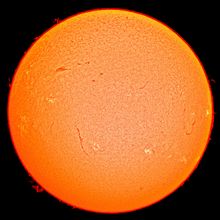in physics. the potential to do work.
| Energy | |
|---|---|
 The Sun is the source of energy for most of life on Earth. As a star, the Sun is heated to high temperatures by the conversion of nuclear binding energy due to the fusion of hydrogen in its core. This energy is ultimately transferred (released) into space mainly in the form of radiant (light) energy. | |
Common symbols | E |
| SI unit | joule |
Other units | erg, calorie, kcal, BTU, kW⋅h, eV |
| In SI base units | J = kg m2 s−2 |
| Extensive? | yes |
| Conserved? | yes |
| Dimension | M L2T−2 |
In physics, energy is the quantitative property that must be transferred to an object in order to perform work on, or to heat, the object. Energy is a conserved quantity; the law of conservation of energy states that energy can be converted in form, but not created or destroyed. The SI unit of energy is the joule, which is the energy transferred to an object by the work of moving it a distance of 1 metre against a force of 1 newton.
Common forms of energy include the kinetic energy of a moving object, the potential energy stored by an object's position in a force field (gravitational, electric or magnetic), the elastic energy stored by stretching solid objects, the chemical energy released when a fuel burns, the radiant energy carried by light, and the thermal energy due to an object's temperature.
Mass and energy are closely related. Due to mass–energy equivalence, any object that has mass when stationary (called rest mass) also has an equivalent amount of energy whose form is called rest energy, and any additional energy (of any form) acquired by the object above that rest energy will increase the object's total mass just as it increases its total energy. For example, after heating an object, its increase in energy could be measured as a small increase in mass, with a sensitive enough scale.
Living organisms require exergy to stay alive, such as the energy humans get from food. Human civilization requires energy to function, which it gets from energy resources such as fossil fuels, nuclear fuel, or renewable energy. The processes of Earth's climate and ecosystem are driven by the radiant energy Earth receives from the sun and the geothermal energy contained within the earth.
